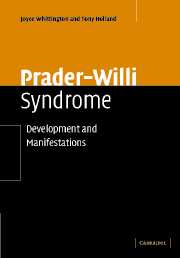Book contents
- Frontmatter
- Contents
- Preface
- Acknowledgements
- Part I Background: Prader—Willi syndrome, why, what, and how to investigate
- 1 Background and historical overview
- 2 Biological and regulatory mechanisms in PWS
- 3 The Cambridge PWS project
- Part II Prader—Willi syndrome prevalence, phenotypic functioning and characteristics
- Part III Minor findings, some conclusions and future directions
- Index
1 - Background and historical overview
from Part I - Background: Prader—Willi syndrome, why, what, and how to investigate
Published online by Cambridge University Press: 13 August 2009
- Frontmatter
- Contents
- Preface
- Acknowledgements
- Part I Background: Prader—Willi syndrome, why, what, and how to investigate
- 1 Background and historical overview
- 2 Biological and regulatory mechanisms in PWS
- 3 The Cambridge PWS project
- Part II Prader—Willi syndrome prevalence, phenotypic functioning and characteristics
- Part III Minor findings, some conclusions and future directions
- Index
Summary
Why study Prader—Willi syndrome?
Prader—Willi Syndrome (PWS) is a genetically determined neurodevelopmental disorder due to one of four presently identified genetic abnormalities that result in the absence of expression of one or more genes at the locus q11—q13 on chromosome 15. Under normal circumstances, these particular genes are expressed when inherited from the father but when of maternal origin they are imprinted (switched off) and therefore in specific tissues are not expressed. The genetic abnormalities associated with PWS result in the alleles of paternal origin being absent and, because the maternal copy is normally imprinted, neither of the alleles of the putative PWS gene(s) are expressed, leading to significant consequences for the developing baby in utero and subsequently throughout the person's lifespan. As described in detail later, PWS is characterised by extreme floppiness (neonatal hypotonia) at birth with failure to thrive and a range of physical, behavioural and cognitive abnormalities that become apparent during development and give rise to often complex health and social needs.
In PWS three significant areas of concern come together. First, there is the developmental delay and the intellectual and functional impairments characteristic of those with an ‘intellectual disability’. Second, there is a marked tendency to overeat and the life-threatening obesity that can arise.
- Type
- Chapter
- Information
- Prader-Willi SyndromeDevelopment and Manifestations, pp. 3 - 15Publisher: Cambridge University PressPrint publication year: 2004
- 3
- Cited by



